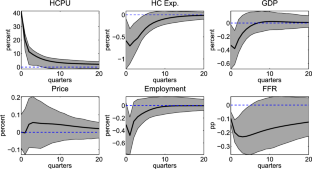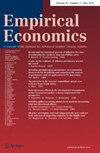医疗保健政策的不确定性和州级就业
IF 1.9
4区 经济学
Q2 ECONOMICS
引用次数: 0
摘要
本研究调查了医疗保健政策不确定性(HCPU)对美国总体和州一级就业的影响。利用1985Q1-2021Q4的季度数据,我们估计了一个结构向量自回归模型,发现HCPU对总体和国家层面的就业都有不利影响。州一级的影响在程度和影响持久性方面都是不同的,持续时间长达5个季度。这种异质性可以用各州特有的结构性因素来解释,最明显的是工作权立法。这项研究表明,医疗保健政策的不确定性带来的经济成本可能在一定程度上是可以预防的。本文章由计算机程序翻译,如有差异,请以英文原文为准。

Health care policy uncertainty and state-level employment
This study investigates the effects of health care policy uncertainty (HCPU) on aggregate- and state-level employment in the USA. Using quarterly data during 1985Q1–2021Q4, we estimate a structural vector autoregressive model and find that HCPU has adverse effects on both aggregate- and state-level employment. The effects at the state level are heterogeneous in terms of both the magnitude and the impact persistence, lasting up to 5 quarters. The heterogeneity can be explained by state-specific structural factors, most notably the right-to-work legislation. The study suggests that uncertainty in health care policies has an economic cost that may be partially preventable.
求助全文
通过发布文献求助,成功后即可免费获取论文全文。
去求助
来源期刊

Empirical Economics
Multiple-
CiteScore
4.40
自引率
0.00%
发文量
157
期刊介绍:
Empirical Economics publishes high quality papers using econometric or statistical methods to fill the gap between economic theory and observed data. Papers explore such topics as estimation of established relationships between economic variables, testing of hypotheses derived from economic theory, treatment effect estimation, policy evaluation, simulation, forecasting, as well as econometric methods and measurement. Empirical Economics emphasizes the replicability of empirical results. Replication studies of important results in the literature - both positive and negative results - may be published as short papers in Empirical Economics. Authors of all accepted papers and replications are required to submit all data and codes prior to publication (for more details, see: Instructions for Authors).The journal follows a single blind review procedure. In order to ensure the high quality of the journal and an efficient editorial process, a substantial number of submissions that have very poor chances of receiving positive reviews are routinely rejected without sending the papers for review.Officially cited as: Empir Econ
 求助内容:
求助内容: 应助结果提醒方式:
应助结果提醒方式:


